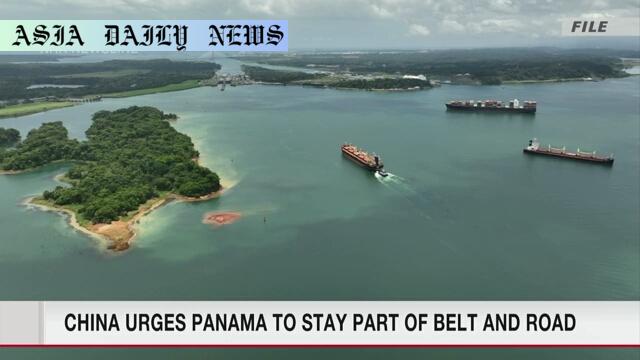Belt and Road: China urges Panama to rethink its exit decision, emphasizing long-term bilateral gains and resisting external pressures.
China calls on Panama to reconsider leaving the Belt and Road initiative.
Panama’s departure was formally communicated to China.
China accuses the US of interfering in Belt and Road cooperation.
Panama audits Hong Kong-based port managers near the Canal.

Introduction: China and Panama at a Crossroads
China’s Belt and Road Initiative (BRI) has been a hallmark of its international policy over the past decade, aimed at fostering global trade and infrastructure connectivity. However, Panama’s recent decision to withdraw from the initiative has sparked waves across international relations. A Chinese foreign ministry spokesperson, Lin Jian, has publicly urged Panama to reconsider its exit, highlighting the need to prioritize long-term bilateral ties and the welfare of their respective populations. This development underscores the broader complexities of international diplomacy, external pressures, and the geopolitical influence of competing powers like the United States.
What is the Belt and Road Initiative?
The Belt and Road Initiative, launched in 2013 by Chinese President Xi Jinping, is a global development strategy. It involves investment in infrastructure projects such as railways, ports, highways, and telecommunications aimed at connecting Asia, Europe, Africa, and the Americas. Over 140 countries have signed up for the initiative, seeking the economic benefits of enhanced trade networks and infrastructure development. For China, it serves as a flagship policy to bolster its global influence and economic partnerships.
Panama’s Decision to Leave the BRI
Panama’s sudden decision to withdraw from the Belt and Road has left many questions unanswered. According to reports, President Jose Raul Mulino revealed that their embassy in Beijing formally notified the Chinese government about their exit. While no official reason has been disclosed, analysts point to mounting external pressures, particularly from the United States, as a key factor. The decision might also stem from growing scrutiny and auditing of Chinese-linked operations within Panama, such as the management of key ports near the Panama Canal by a Hong Kong-based company.
China’s Response: A Call for Reconsideration
In response to this development, Lin Jian emphasized the benefits of the Belt and Road Initiative for both nations. He urged Panama to remain an active participant, keeping in mind the long-term bilateral relationship and mutual interests of the public. Lin accused the United States of interfering in the collaboration between China and Panama, reflecting broader geopolitical tensions that have hovered over the initiative.
US Involvement and Geopolitical Tensions
In recent years, the Belt and Road Initiative has frequently become a battleground for US-China competition. The United States has voiced concerns about countries falling into a “debt trap” under BRI-funded projects and has actively tried to counter China’s growing influence. In the case of Panama, US President Donald Trump has even claimed that the Panama Canal is under Chinese operation, an assertion viewed as part of the broader campaign against Chinese economic expansion. This geopolitical standoff appears to have had a tangible influence on Panama’s decision to leave the initiative.
The Strategic Importance of Panama
Panama holds significant strategic value on the global stage due to the Panama Canal—a critical maritime passageway connecting the Atlantic and Pacific oceans. Control and management of this waterway have historically been a point of contention among global powers. The recent decision to audit the operations of Hong Kong-based managers at the ports near the canal entrances only highlights the strategic sensitivity surrounding the region. For China, maintaining active partnerships with Panama is essential for sustaining its economic and geopolitical aspirations in Central America.
Potential Ramifications and Global Impact
Panama’s withdrawal from the BRI could have significant implications for both nations and the global order. It could prompt other Central American nations to reconsider their alignment with China’s initiative and potentially exacerbate US-China tensions further. For China, the exit highlights the growing challenges to its global influence amidst rising scrutiny and opposition from the West. For Panama, the decision may strain its relations with a major trading partner but could also open pathways for closer ties with the US and its allies.
Conclusion: Moving Forward in a Complex Landscape
As the situation unfolds, the world will closely watch Panama’s next moves and China’s diplomatic efforts to mitigate the impact of this withdrawal. The interplay between national interest, external influence, and global partnerships will likely play a central role in defining the future of the Belt and Road Initiative. Ultimately, Panama’s decision serves as a reminder of the challenges facing ambitious global policies in an increasingly polarized geopolitical landscape.



Commentary
A Call for Thoughtful Diplomacy
China’s response to Panama’s withdrawal from the Belt and Road Initiative is a testament to the significance the initiative holds for Beijing. By urging reconsideration, China is not only protecting its economic ventures but also signaling the importance of long-term partnerships. However, this situation serves as a reminder of the nuances involved in global diplomacy. Countries like Panama often find themselves caught between competing superpowers, each offering benefits yet demanding loyalty.
Geopolitics and Local Interests
Panama’s strategic location and control of the Panama Canal render it particularly vulnerable to geopolitical tug-of-war. While aligning with China may offer infrastructure and economic gains, the historical and political proximity to the United States presents a different set of opportunities and risks. In leaving the BRI, Panama appears to be prioritizing its relationship with Washington—though this move might come at the cost of future investment opportunities from Beijing.
Lessons for Smaller Nations
This scenario offers valuable lessons for smaller nations navigating the dynamics of global powers. Decisions in favor of one bloc or another must be taken with caution and foresight, considering both immediate gains and long-term implications. For Panama, balancing relations with both China and the US will remain a challenging yet crucial aspect of its foreign policy in the years to come. Only time will tell if this decision proves beneficial or limiting for the Central American nation.